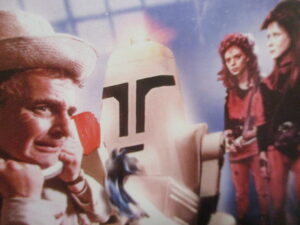Paradise Towers
“Hail the Kang. Hail the unalive Kang. Yellow of colour, but brave and bold as a Kang should be.” – The Kangs
 Though it still has problems, I feel that Paradise Towers is a much better story for the Seventh Doctor than the first one. The humor is more subdued (like the Doctor doffing his hat to the standing pipe because “you never can tell”), and Sylvester McCoy gets to begin showing his serious side. We also see the start of the Doctor arranging people as pieces in a game, finding and expanding their strengths, encouraging them to grow.
Though it still has problems, I feel that Paradise Towers is a much better story for the Seventh Doctor than the first one. The humor is more subdued (like the Doctor doffing his hat to the standing pipe because “you never can tell”), and Sylvester McCoy gets to begin showing his serious side. We also see the start of the Doctor arranging people as pieces in a game, finding and expanding their strengths, encouraging them to grow.
On the other hand, there are particular problems in the design and the dialogue. It’s a shame that Mel doesn’t do much in this episode except seem rather irritating going on and on about the pool. There’s a lot of campiness to the sets and much of the script is awkward explanation of the obvious. While the constant Caretaker references to the rulebook (“Oh dear, oh dear. Poor Caretaker number three four five stroke twelve subsection three.”) or the Kang street slang are somewhat amusing, they do get a bit wearisome. (I really do like the idea of them having incorporated the signs of the hotel into the Kang language. They also make more sense as characters if you imagine them as abandoned children rather than adults). Some moments are just unnecessarily repetitive like the constant return to watching a Cleaner taking another body down to the basement.
The acting definitely goes a bit over the top in this story as well, with Pex being the worst offender. As a kid, I felt so sorry for him, especially as he is mercilessly teased by everyone else. As an adult, he’s a lot less endearing since he is obviously trying too hard to look like somebody that’s trying too hard. If he had been more earnest, I think his ending sacrifice would have been even more striking. While not as important, the whole time frame of the story doesn’t quite make sense. How long have the people been left alone in Paradise Towers. Ages it seems from the decay but if the young and the old were left behind then how are they still the young and old today?
I think the most problematic aspect of the story is the tone. Most of the characters seem very cartoonish for most of the story and yet at the end everyone is suddenly very human, experiencing fear, regret, and bravery. I kind of find this sudden shift a bit off-putting–but on the other hand I also feel like this is the saving grace of the story. It’s really the tear-jerk ending as everyone comes together to fight the common enemy and Pex sacrifices himself that really makes the story worthwhile.
Best (or worst) unsettling moment:
They don’t just hint that the old ladies might be cannibals—they literally have a pile of human bones on their plate! I also love the interaction: “People just don’t vanish, do they?” asks Maddy. “No, no, of course not. There’s always something left behind…” Tabby replies coyly as she covers her plate with a napkin.
Regrets:
Everything about the production of this story is just bulky and oversized—the design of the cleaning robots, the accents of the characters, the larger than life villain. It puts a bit of comic spin on what should have instead been a gritty tale.
